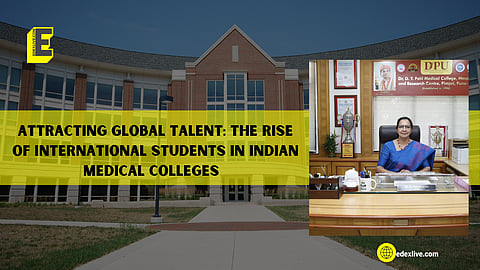

In recent years, India has emerged as a prominent destination for medical education, attracting thousands of international students from various countries. This influx represents not just a pursuit of quality education but also reflects India's growing global stature in the healthcare sector.
Following are the factors contributing to this trend, the implications for the Indian medical landscape, and the opportunities it presents for both students and institutions.
Quality of education
One of the key factors drawing international students to Indian medical colleges is the increasing recognition of the quality of education offered. Indian medical institutions are ranked among the top in the world. Indian medical colleges are equipped with modern facilities, experienced faculty and diverse curriculum that adheres to international standards.
Furthermore, the affordability of medical courses in India compared to Western countries makes it an attractive option for many.
Diverse patient population and practical exposure
India's diverse demographics offer medical students an unparalleled opportunity to gain hands-on experience with a wide array of health conditions and treatment approaches. With its mix of urban and rural populations, varying socio-economic groups, and distinct regional health challenges, the country provides a richly varied healthcare environment.
This exposure equips students with the skills and adaptability needed to address diverse medical issues, making them well-prepared to practice in multicultural and global settings.
Language and cultural familiarity
For students from neighbouring countries, studying medicine in India comes with the benefit of linguistic and cultural familiarity. The widespread use of English as the medium of instruction in most medical colleges ensures smooth communication and academic engagement.
Additionally, cultural similarities make it easier for international students to adapt to their new environment, fostering a sense of belonging and enabling them to focus on their studies and professional growth.
Global recognition of Indian degrees
The recognition of Indian medical degrees by various international organisations is a crucial factor in attracting students from around the world.
Many Indian medical colleges are accredited by the World Health Organization (WHO) and are listed in the Directory of World Medical Schools, which ensures that the qualifications earned in India meet global standards.
Additionally, several Indian medical colleges have partnerships and exchange programs with international universities, further boosting their global reputation. These collaborations allow students to gain exposure to international medical practices and research, preparing them for a career that transcends national boundaries.
For students aspiring to work in globally recognised healthcare systems, the accreditation and international standing of Indian medical degrees are powerful motivators to choose India as their destination for medical education.
Opportunities for research and innovation
India is increasingly becoming a hub for medical research and innovation. International students have access to cutting-edge research projects and medical trials that allow them to engage in meaningful work that could have a real-world impact.
Government initiatives and policies
The Indian government has recognised the potential of attracting international students and has introduced various initiatives to facilitate this. Policies such as the Study in India programme aim to promote Indian higher education globally, offering scholarships and easing visa regulations for foreign students.
These efforts aim to make India a more attractive destination for international medical tourism and education. For medical education in particular, these policies help position India as a hub for quality and affordable medical training.
The government's focus on creating a welcoming and inclusive environment for international students aligns with its broader goals of fostering global academic collaborations and knowledge exchange.
The euture of medical Education in India-
The increasing number of international students indicates a promising future for medical education in India. As more institutions adapt to global educational standards and create welcoming environments for international students, India can solidify its reputation as a leader in medical education and healthcare.
Exploring the cultural diversity of India international students
International students are often captivated by the mystique of India, a land rich in history, culture, and natural beauty. The country’s varied topography, ranging from the towering Himalayas in the north to the serene backwaters of Kerala in the south, offers a unique backdrop for academic pursuits.
From vibrant cities bustling with modern energy to tranquil rural landscapes steeped in tradition, India presents a rich tapestry of experiences that extend beyond the classroom.
(Dr Rekha Arcot is the Dean of Dr DY Patil Medical College, Hospital & Research Centre, Pimpri, Pune. Views expressed are her own.)
